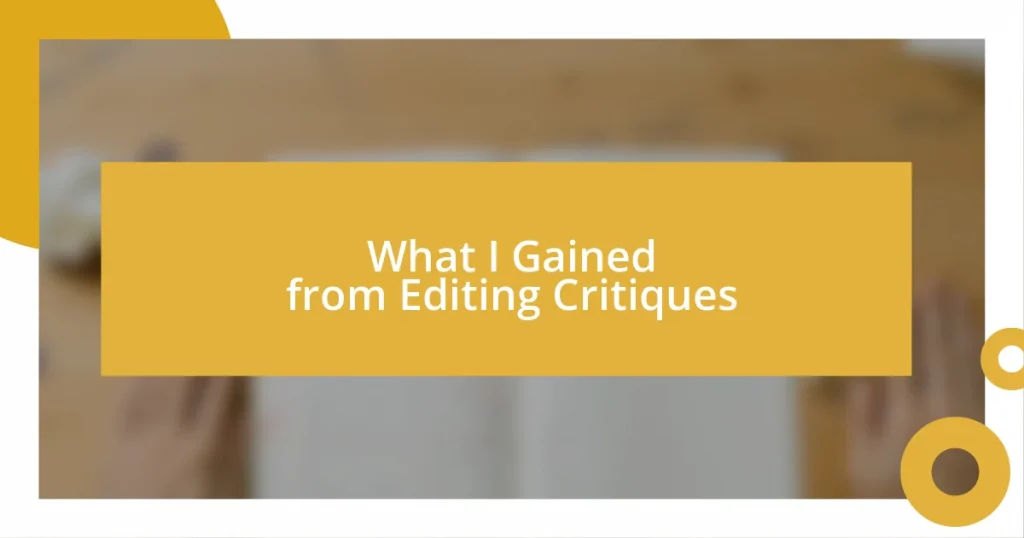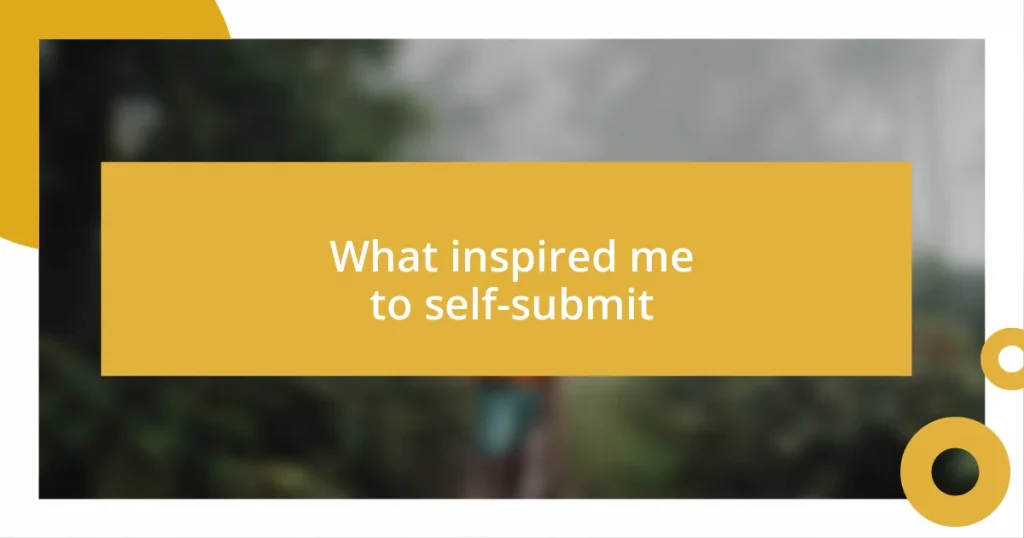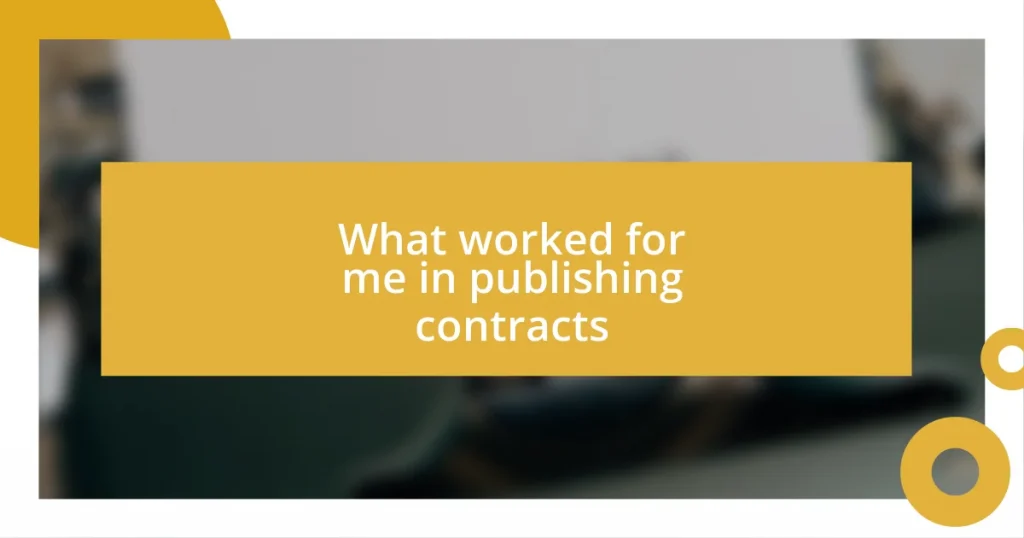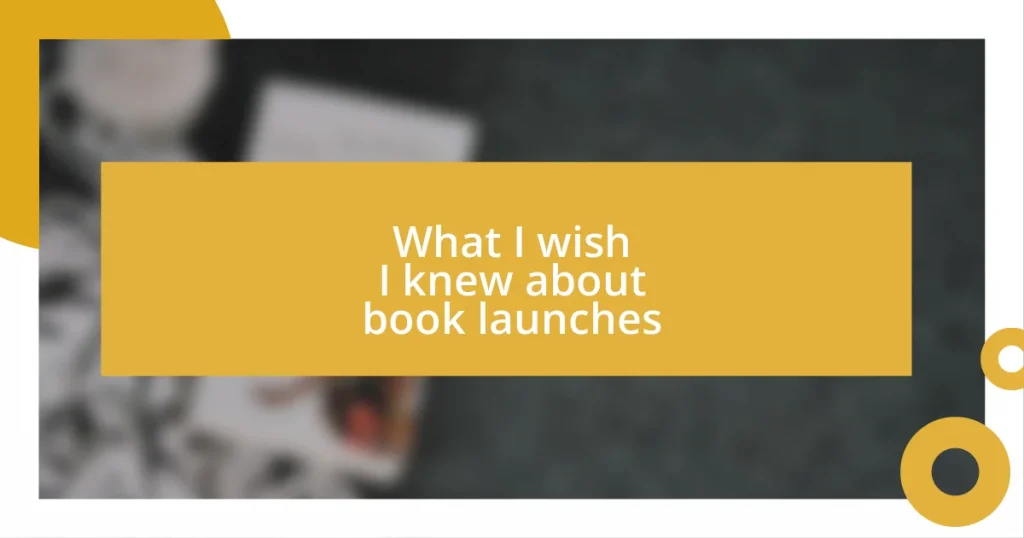Key takeaways:
- Feedback serves as a catalyst for growth, encouraging writers to embrace constructive criticism and use it as a tool for improvement in clarity, style, and creativity.
- Building a supportive writing community fosters connections and reciprocity, making the critique process more enriching and validating for all members.
- Adopting a growth mindset allows writers to view critiques as opportunities for evolution, transforming daunting feedback into stepping stones for future projects.
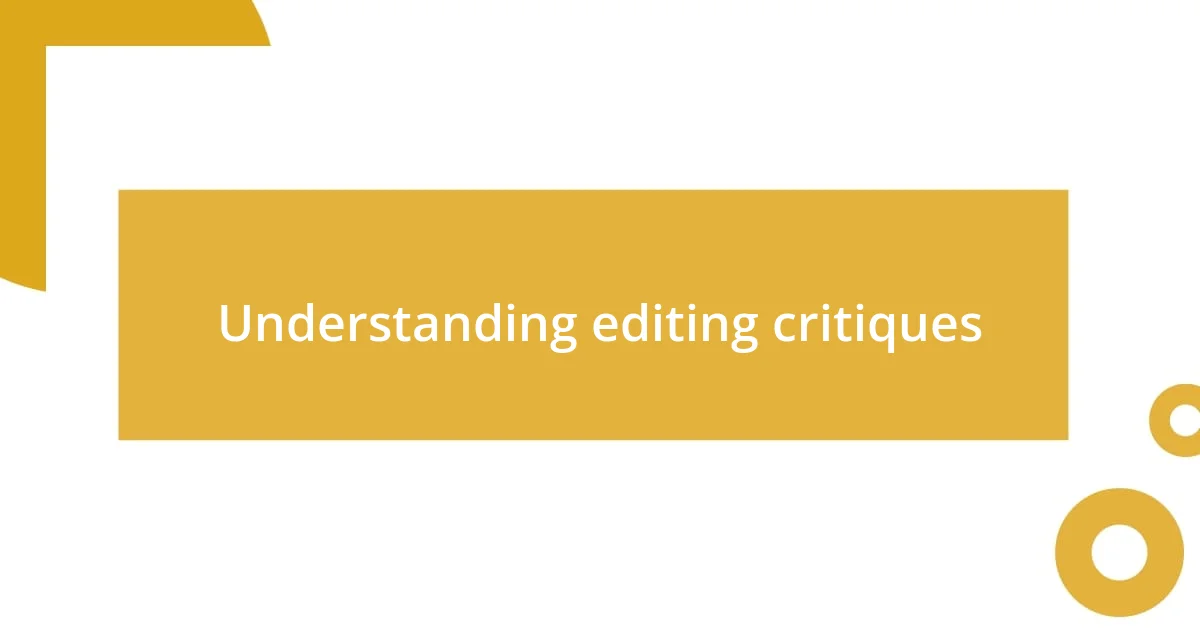
Understanding editing critiques
Editing critiques are invaluable tools for growth. I remember my first critique session; my palms were sweaty as I prepared for feedback. But instead of feeling defensive, I found myself excited to transform the suggestions into action steps—I learned that critiques are really opportunities in disguise.
When I received constructive criticism on a project, it felt like a punch to the gut at first. It made me confront vulnerabilities I hadn’t noticed in my writing. But then I realized: Isn’t it essential to embrace feedback if I truly want to improve? That realization turned the critique into a pathway, guiding my writing toward clarity and precision.
Navigating through editing critiques can feel daunting, but they often highlight blind spots I’ve missed during my writing process. I like to think of them as conversation starters, prompting me to dig deeper into my creative choices. How often do we pause to reflect on our work without considering an external perspective? Embracing these critiques taught me that each piece of feedback is a stepping stone to becoming a better writer.
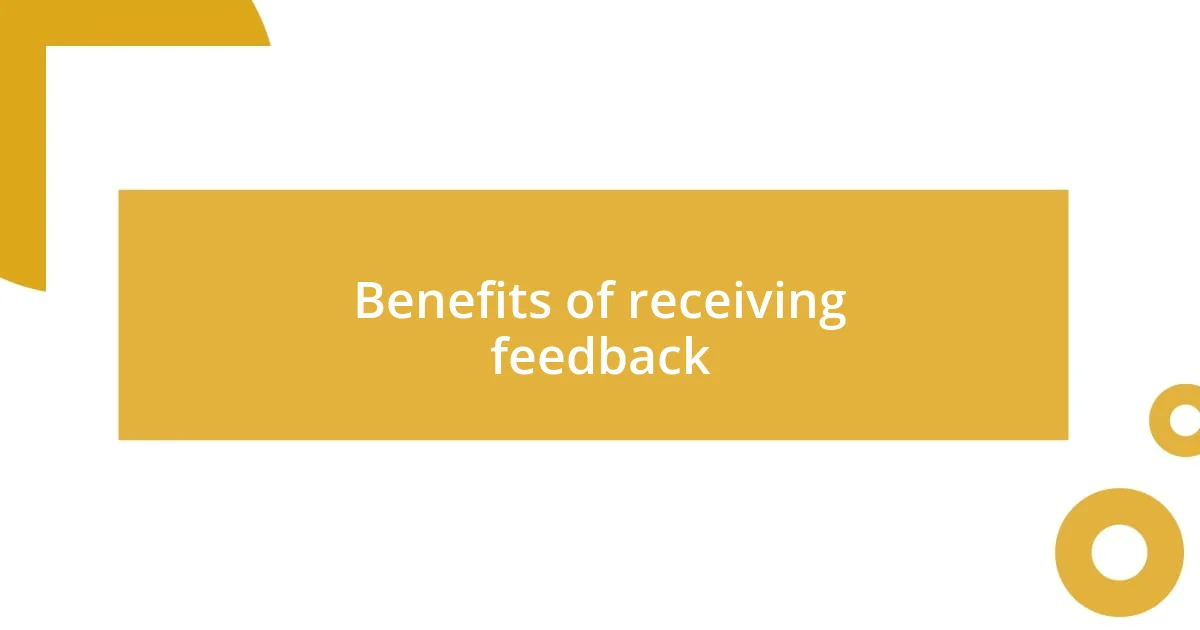
Benefits of receiving feedback
Receiving feedback can truly be transformative. Each critique I’ve encountered has been like a mirror reflecting aspects of my writing I may have overlooked. I vividly recall one instance when a mentor pointed out my tendency to be too verbose. Initially, I felt a wave of embarrassment, but that feedback sparked a journey of honing the brevity and impact of my words.
Moreover, feedback often cultivates a sense of collaboration. When peers or editors share their suggestions, it opens the door to meaningful conversations about my work. Once, during a workshop, a fellow writer proposed an entirely different approach to a piece I thought was finished. At first, I resisted, but that dialogue ultimately led to a more dynamic piece, one that resonated deeper with readers.
On a more emotional level, feedback can boost your confidence by validating your creative choices. I remember getting a comment on a draft that said my character development was relatable and engaging. That moment lit a spark of pride in my heart, reinforcing the idea that feedback isn’t just about improvement; it’s also about recognizing what works well. Such recognition fuels my passion for writing and encourages me to keep pushing the boundaries of my creativity.
| Benefit | Description |
|---|---|
| Growth | Constructive feedback identifies areas for improvement, fostering talent development. |
| Collaboration | Feedback encourages engaging discussions that enhance creative processes. |
| Confidence | Positive critique validates strengths, boosting self-esteem and motivation. |
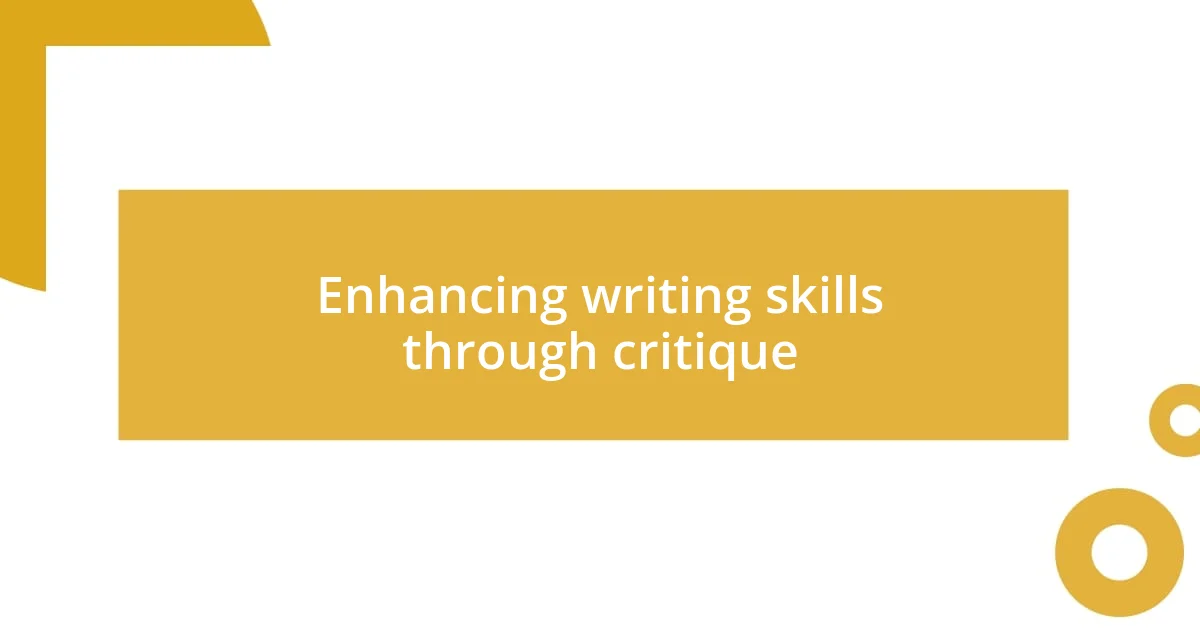
Enhancing writing skills through critique
Critique has played a pivotal role in refining my writing skills. I recall a specific occasion when a peer pointed out my overuse of the word “really.” At first, I was taken aback; it felt like I had a bad habit I’d never noticed. Yet, this moment became a catalyst for me. I began to explore more vivid language to convey my thoughts, resulting in a more engaging style. The realization that such a simple observation could illuminate significant growth made me eager to seek more critiques.
Reflecting on the critiques I’ve received, I’ve discovered several key lessons that I continuously apply to my writing. Here are some insights that have always stuck with me:
-
Perspective Shift: Each piece of feedback can offer a fresh viewpoint, helping me see my work through someone else’s eyes.
-
Clarity and Focus: Critiques encourage me to tighten my prose, ensuring my ideas shine clearly without unnecessary fluff.
-
Daring to Experiment: Feedback often inspires me to take creative risks, leading to unexpected and captivating results.
-
Ongoing Development: Each critique reminds me that writing is an evolving journey, and there’s always room for learning and improvement.
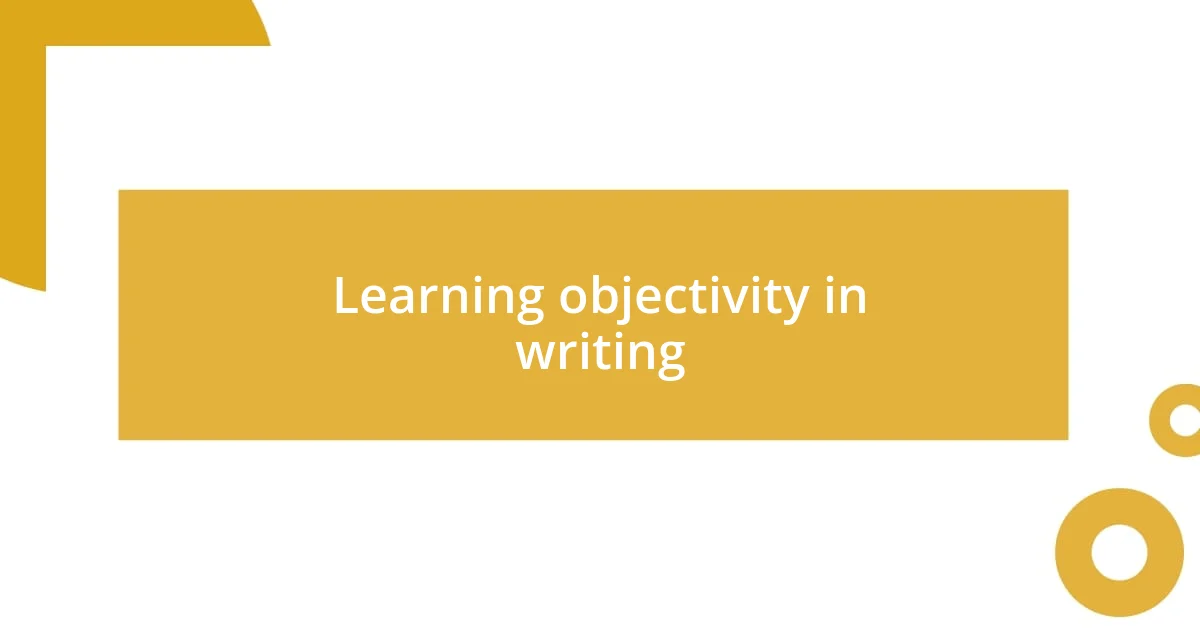
Learning objectivity in writing
Learning to write objectively is a skill that has transformed my approach to crafting words. In one memorable session, I received feedback from an editor who suggested I detach my emotions from certain passages. At first, it felt like they were asking me to strip away my voice, but, as I dug deeper, I realized they wanted me to create space for clarity—my own feelings wouldn’t drown out the message I aimed to deliver.
Through this process, I began to understand how objectivity can enhance storytelling. An instance that stands out for me was when I reworked a scene that initially felt too personal and chaotic. By stepping back and viewing it through a more objective lens, I not only improved its coherence but also allowed readers to connect with the experience on their own terms. Have you ever experienced a moment of clarity in your writing? Those moments remind me that stepping away, even briefly, can offer incredible insights into the essence of our narratives.
Objectivity doesn’t mean erasing passion; instead, it’s about finding a balance. I’ve learned to invite critique into my writing without feeling defensive. Thanks to this shift, I now welcome feedback as a tool for cultivating a professional tone while retaining my unique voice. This harmonious blend has not only refined my work but has made writing a more fulfilling journey.
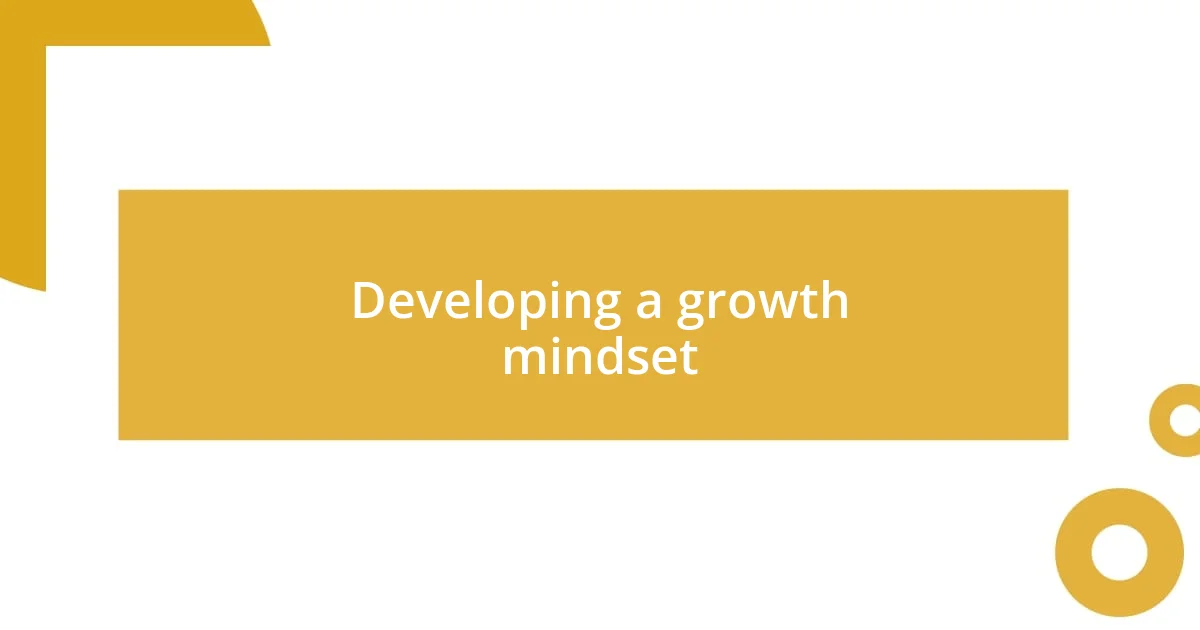
Developing a growth mindset
Embracing a growth mindset has been a game-changer for me when it comes to receiving critique. I remember a time when a trusted mentor pointed out that my writing often felt too academic, lacking warmth and relatability. Initially, that struck me hard—wasn’t clarity paramount? But that feedback ignited a drive in me to infuse my writing with more personality. I started incorporating storytelling techniques, turning mere facts into engaging narratives that genuinely resonate with readers. This shift not only elevated my writing but also brought joy back into the process.
When I began to view critiques as stepping stones rather than stumbling blocks, I noticed a profound change in my writing attitude. I asked myself, “What if this feedback, no matter how tough, is an invitation to evolve?” Every suggestion, even the ones that felt harsh, became an opportunity for growth. It’s amazing how shifting my perspective helped me appreciate the value of constructive criticism; it transformed daunting feedback into a toolkit for developing my skills.
Through this journey, I’ve discovered that adopting a growth mindset means celebrating small victories. I recall a moment of triumph when a piece I had revised based on feedback received praise for its newfound clarity. I couldn’t help but reflect on the power of critiques in leading me there. So I ask you, how can you leverage critique to chart your path of growth? For me, it’s about continually seeking feedback and recognizing that each critique has the potential to unlock new levels of creativity and innovation.
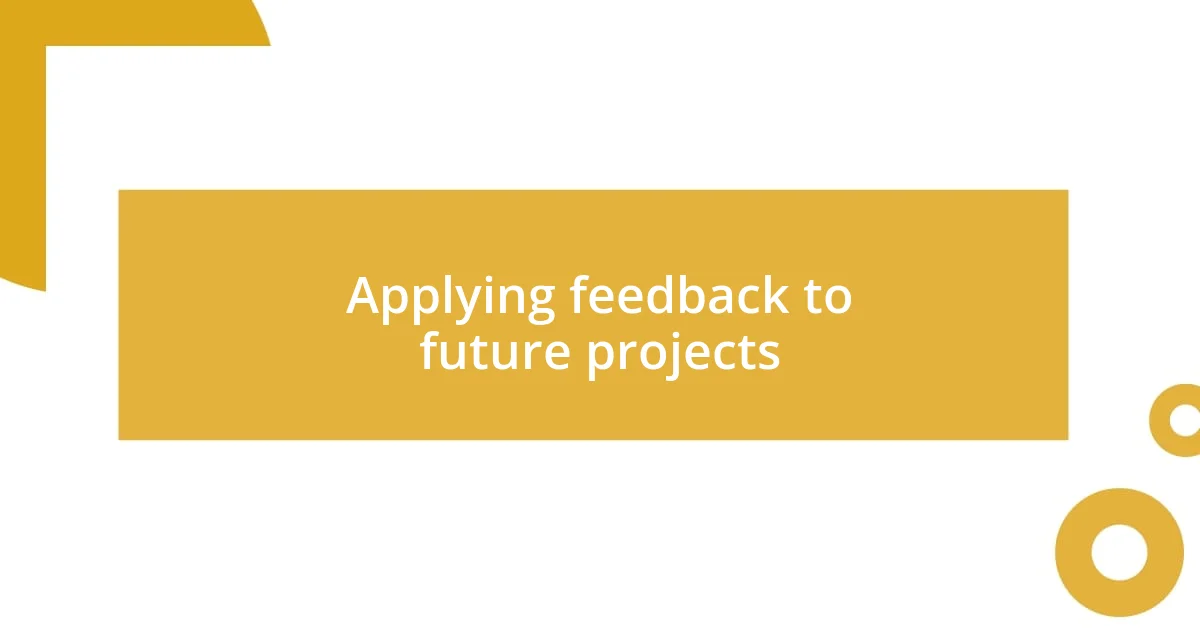
Applying feedback to future projects
Integrating feedback into future projects is like planting seeds for better writing down the road. I remember a time when an editor pointed out that my pacing was off in a draft. At first, I felt overwhelmed. But then I reflected on what they said and realized that improving my pacing could not only enhance that particular piece but also elevate all my future writing. Have you ever felt almost liberated by a suggestion that seemed daunting at first? That realization shifted my approach, making it less about fixing one piece and more about cultivating a skill for future projects.
As I started to implement changes based on critiques, I noticed small but meaningful transformations in my writing style. For instance, I began to weave in more character development in my stories after receiving feedback that my characters sometimes felt one-dimensional. Each project became a canvas where I tested these new techniques. It’s exhilarating to see how tweaks inspired by critiques lead to richer stories. Isn’t it fascinating how feedback can serve as a compass guiding us toward our creative potential?
One particular revision stands out vividly: I restructured an entire storyline after recognizing patterns in feedback regarding clarity. The breakthrough came when I revisited an earlier draft and applied those insights. The result was not only a more cohesive narrative but also a newfound confidence in my ability to adapt. This experience taught me that every piece of feedback has the potential to illuminate blind spots, continuously shaping my writing journey. So, what if we embraced feedback not just for what it is, but for all it can become? I invite you to consider how each piece of critique can turn into a stepping stone for the projects you tackle next.
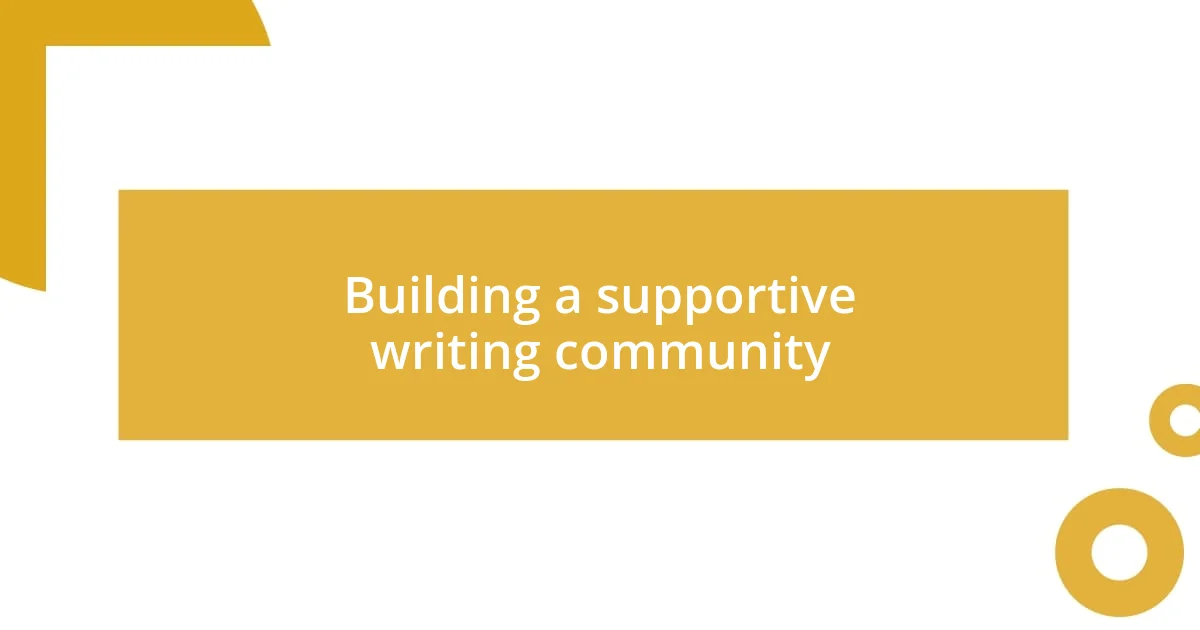
Building a supportive writing community
Building a supportive writing community starts with connection. I’ll never forget the first time I joined a local writers’ group. Walking into that small café, surrounded by strangers who shared my passion, was both exhilarating and nerve-wracking. Yet, the moment we began exchanging our pieces and thoughtfully critiquing each other’s work, I felt an immediate sense of belonging. It was as if I had stumbled upon a hidden treasure trove of encouragement and insight.
In crafting a community, it’s essential to foster an environment where vulnerability is embraced. I recall a time when I shared a personal essay that laid bare my insecurities. To my surprise, the feedback was filled with kindness, and each commenter shared similar sentiments. This exchange not only validated my experiences but also built a bridge between us, fostering deep connections based on shared struggles and triumphs. How often do we find that our fears echo in the hearts of others? By cultivating openness, we create a space where everyone feels empowered to express their truth.
As I grew within this community, I began to realize the importance of reciprocity. I’ve learned that giving feedback is just as valuable as receiving it. There was a moment when I had the chance to help a fellow writer refine her narrative arc. Seeing her eyes light up with understanding as I shared my thoughts was a rewarding experience, and it deepened our bond as writers. Isn’t it wonderful how supporting one another can elevate the entire group? This mutual exchange fuels growth and innovation, enriching not only our individual talents but also our collective ability to create compelling narratives.










